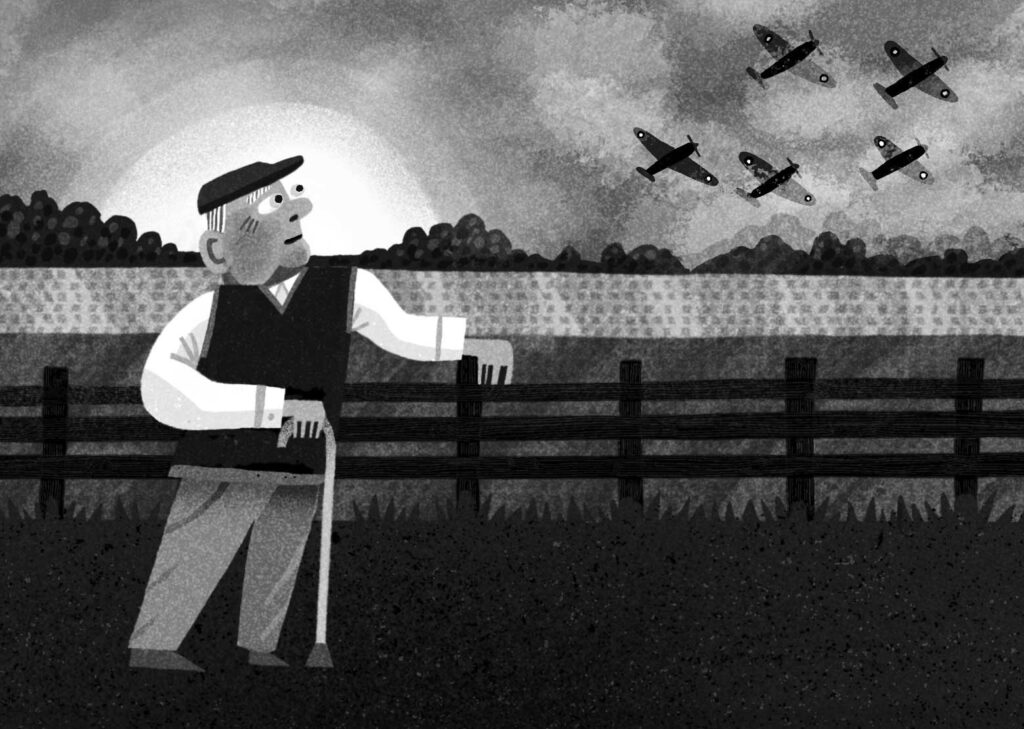Hank Dunfield, aged ninety-nine, was an accomplished tail gunner during the Second World War. Now the “tough old bird” lives in a long-term-care home, where he tells off-colour jokes, needles his fellow residents, and sneaks contraband sweets past exasperated nurses. He suffers from dementia, but he’s whip-smart and laugh-out-loud funny. Candy canes? “Only truly enjoyed by felons in need of a shiv.” Hors d’oeuvres? “Little things that look like they died at birth served on toast.”
Hank is one of three characters in Meg Braem’s Flight Risk, a play first performed in Calgary in 2017. Seven years later, and in the wake of COVID‑19, the pragmatic meditation on mortality feels especially poignant. Braem doesn’t wring her hands over questions of death. She’s practical and to the point: We’re all going to get older. We’re all going to die. Given that reality, can someone still living be so far gone that they no longer have a right to self-determination? Can we ever say that someone’s life is functionally — if not literally — over?
A brief but insightful foreword explains the production’s origin. In 2016, at thirty-two, Braem lost her father, then her job, then sight in one of her eyes. Recurring headaches and dizziness followed. The diagnosis? Multiple sclerosis. Distressed, the dramatist took to interviewing nursing home residents. “These were people who had lived active, rich lives and weren’t sure who they were anymore,” she explains. “I could relate.” During those visits, Braem met plenty of vets, and, inspired by their stories, she created Flight Risk and its elderly protagonist, who represents “a composite of all these men.”

Before the curtain falls on an aging airman’s final act.
Sandi Falconer
The play’s other two characters are relatively youthful nurses: Kathleen Shore, an overworked fiftysomething supervisor, and Sarah Baker, an ambitious twentysomething student. The first scene opens with the exhausted Kathleen assigning the amiable Sarah to look after Hank. Initially cantankerous, he taunts the young woman. Her visits are “a drain on taxpayer’s money,” he tells her. The home’s food resembles “cardboard that’s been left out in the rain.” But Sarah’s persistent good nature wears down Hank’s resistance, and the two begin developing an unlikely friendship.
As they grow closer, Hank shares that he has an estranged son and that he’s haunted by being the last surviving member of his flight crew. Sarah reveals that she recently went through a difficult breakup and that she works multiple jobs to make ends meet. She also discloses — after much prodding from Hank, who describes her as “nervous as a nun in a cucumber field”— that she suffers from MS. She describes how her diagnosis upset her parents before admitting, “I don’t want to be treated like a sick person.” Hank’s response: “I don’t want to be treated like an old person.”
It is an unsurprising sentiment from the stubborn senior. Despite his increasingly frail condition, Hank values his remaining independence and despises the long-term-care facility that’s “as much a nursery as a nursing home.” He often wonders how he came to lose control of his own life. “No one asked me if this is what I wanted,” he laments. Accordingly, he’s the “flight risk” of the play’s title, prone to slipping out when no one’s looking. His favourite destination is an empty field, some three kilometres away. It affords an unencumbered view of the sky — ideal for him to imagine being in a plane again. In the most affecting moment, Sarah accompanies Hank on one of his unsanctioned outings, when he reflects on what his war experience taught him:
There is no reason, there is no logic. There’s no reason those boys were shot out of the sky and nothing about me standing here . . . or you . . . or any of it is fair. It’s all just flying in the dark, hoping you won’t get hit.
Flight Risk is understated yet absorbing, thanks to three-dimensional characters and convincing dialogue. Although Hank and Sarah are instantly likeable, they’re realistically flawed. He’s straightforward but tactless; she’s kind-hearted but weak-willed. Likewise, Kathleen isn’t a villainous caricature. While somewhat brusque and managerial, she’s no Nurse Ratched. Braem depicts her sympathetically. Despite Hank’s protests, his candy really is a choking hazard. He really does need help to use the bathroom. Kathleen sincerely means it when she tells Sarah, “I’m doing the very best I can with the resources I’ve got.” These are believable individuals, and the action moves steadily until the end, when things, unfortunately, get somewhat mushy. The final moment, unfolding on Hank’s one-hundredth birthday, is comparatively saccharine.
Director’s notes by Samantha MacDonald follow the primary text, as do two original essays. The first of these, by the historian William John Pratt, explores the formation of the Royal Air Force’s Bomber Command, in 1936, and the gut-wrenching conditions faced by pilots during the Second World War. The second, by the medical doctors David Hogan and Philip St. John, considers the Manitoba Follow‑Up Study, an ongoing health survey of some 4,000 Canadian aircrew, initiated in 1948. (As of 2023, nineteen participants were still alive and being monitored.) These additions provide salient context to a frank and thoughtful work that deserves to be both read and staged widely.
Alexander Sallas can now collect his frequent flyer miles as Dr. Sallas.

